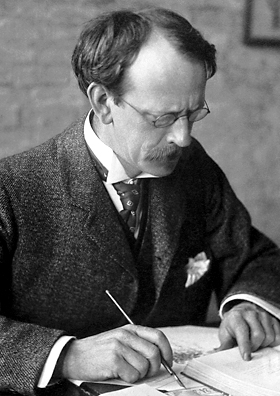Advertencia sobre la no concluyente base experimental de la teoría electrostática, en una nota de la tercera edición de: [James Clerk Maxwell, Tratado sobre electricidad y magnetismo, Vol.1, 3ª edición, Oxford University Press, 1891, 37]
Frases célebres de Joseph John Thomson
Advertencia sobre la no concluyente base experimental de la teoría electrostática, en una nota de la tercera edición de: [James Clerk Maxwell, Tratado sobre electricidad y magnetismo, Vol. 1, 3.ª edición, Oxford University Press, 1891, 37]
Fuente: Lord Rayleigh, La vida de Sir J. J. Thomson (1943), p. 199.
Citado de Lord Rayleigh, la vida de Sir J. J. Thomson (1943), p. 199.
Atribuidos
Joseph John Thomson: Frases en inglés
Warning about the non-conclusiveness for the experimental foundation of electrostatic theory, in a footnote of the third edition of: [James Clerk Maxwell, A Treatise on Electricity and Magnetism, Vol.1, 3rd Edition, Oxford University Press, 1891, 37]
Quotes eat me
“The electron: may it never be of any use to anybody!”
A popular toast or slogan at J. J. Thomson's Cavendish Laboratory in the first years of the 1900s, as quoted in Proceedings of the Royal Institution of Great Britain, Volume 35 (1951), p. 251.
Attributed
"Cathode rays" http://web.lemoyne.edu/~GIUNTA/thomson1897.html Philosophical Magazine, 44, 293 (1897).
Quotes eat me
Contexto: As the cathode rays carry a charge of negative electricity, are deflected by an electrostatic force as if they were negatively electrified, and are acted on by a magnetic force in just the way in which this force would act on a negatively electrified body moving along the path of these rays, I can see no escape from the conclusion that they are charges of negative electricity carried by particles of matter.
Royal Institution Lecture (April 30, 1897) as quoted by Edmund Taylor Whittaker, A History of the Theories of Aether and Electricity from the Age of Descartes to the Close of the Nineteenth Century http://books.google.com/books?id=CGJDAAAAIAAJ (1910).
Quotes eat me
Rays of Positive Electricity (1913).
Quotes eat me
Cited from Lord Rayleigh, The Life of Sir J. J. Thomson (1943), p. 199.
Attributed
"Cathode rays" http://web.lemoyne.edu/~GIUNTA/thomson1897.html Philosophical Magazine, 44, 293 (1897).
Quotes eat me
"Cathode rays" http://web.lemoyne.edu/~GIUNTA/thomson1897.html Philosophical Magazine, 44, 293 (1897).
